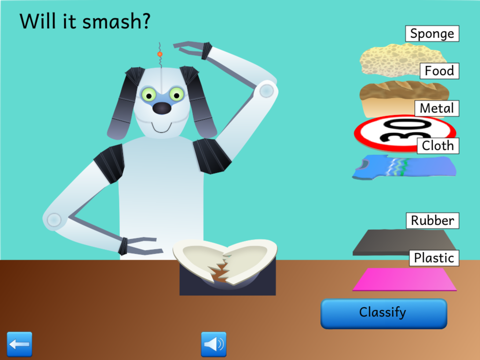
Properties of Materials
Will glass smash? Does rubber stretch? Will wood bend?
Knowing about the basic properties of everyday materials is one of the building blocks of early science education. This Materials app/activity is a quick and easy way for children to conduct experiments to test whether different types of everyday materials will stretch, bend, smash or scratch. And there is no broken glass to clear up afterwards!
In this app/activity, children use Robot Smudge, a robot version of Smudge, to test different types of materials from around the house, which children can sort on the basis of their physical properties. Having a robot to help means the tests will be performed in exactly the same way each time, what scientists call a fair test!
Each of the items can be tested by dragging and placing it between Robot Smudges hands, and Robot Smudge will perform the test. Once completed, children can use the Classify section to record how each of the items performed in the test - whether the item is bendy, stretchy, breakable or non-scratch.
There are a further set of tests, where an individual item of material can be subjected to each of the four tests, and children can record how this item has performed in each category using a number of sliders.
The options page allows the app/activity to be configured for different users:
We want children to think about the properties of the materials and encourage group discussions before performing the tests. So there is an option to allow children to make predictions on how they think each item will behave before trying the test. Once the test has been run, children can compare the actual results with their predictions.
As well as the Options page, Materials has on-screen instructions, audio help and it works in both English and Spanish, which has the additional benefit of helping children with their second language! There is a reporting option to enable childrens progress to be checked by a teacher or a parent.
Materials is part of a series of science activities from Storm Educational, whose apps and software have been widely used in schools and at home over many years. More information about Storm Educational is available on our website www.stormeducational.co.uk, or on twitter @stormeducational
Using Materials will help children in work towards the following curriculum targets:
England Science Everyday Materials Year 1 :
Identify and name a variety of everyday materials
Describe simple properties of a variety of everyday materials
Compare and group together similar everyday materials
Find out how shapes can be changed
Lower KS2:
Use of a fair test
Record findings, identifying differences
Year 5 :
Compare and group together everyday materials and their properties
Wales Sustainable Earth KS2:
Comparison and properties of some natural and man made materials
Wales Outcomes Knowledge of the World Foundation Phase, outcome 3:
Sort objects and materials according to specific criteria
Enquiry KS2:
Pupils should be given opportunity to carry out different types of enquiry
N.Ireland The World Around Us Progression Foundation Stage:
Identify similarities and differences between materials
Australia
Year 1
Everyday materials can be physically changed in a variety of ways (ACSSU018)
Year5&6
Science involves testing predictions (ACSH081 )
Sequence of Achievement:
Year 2 Students describe changes to objects, materials and living things
Year 4 Apply the observable properties of materials
Year 5 Students will be able to classify substances according to their observable properties or behaviour
NGSS
2-PS1-1 Conduct an investigation to describe and classify different types of materials
2-PS1-2 Analyse data from testing different materials, to determine their properties
PS1.A Matter can be described and classified by its observable propertie



